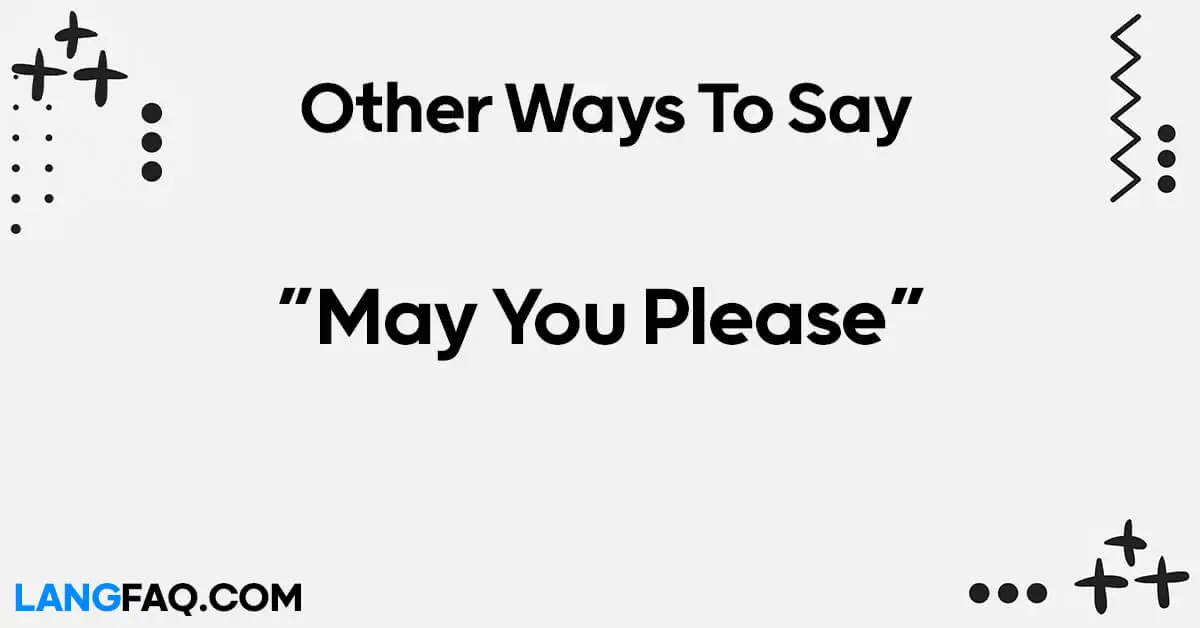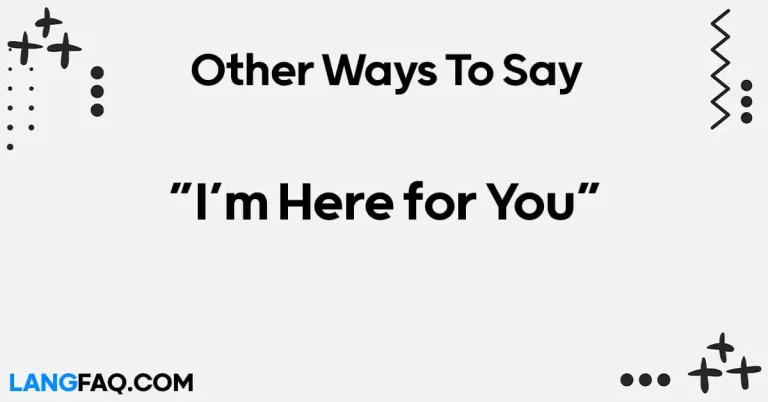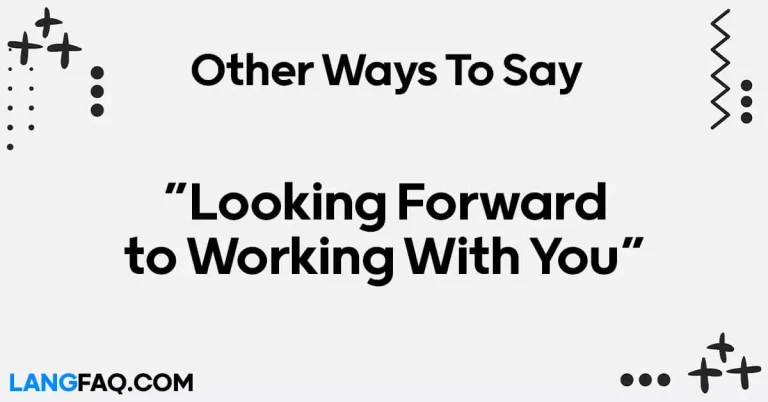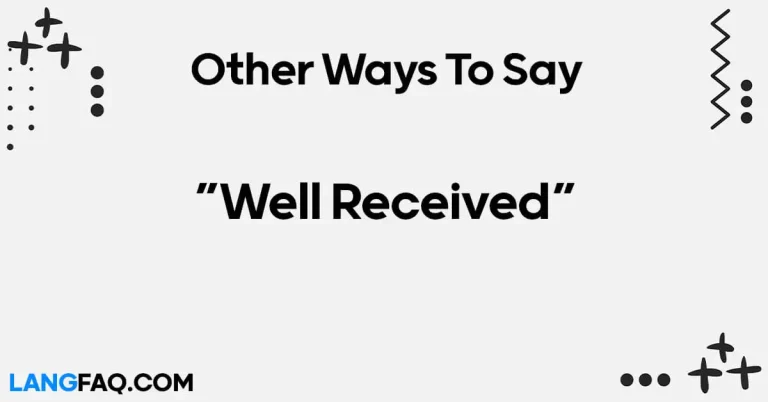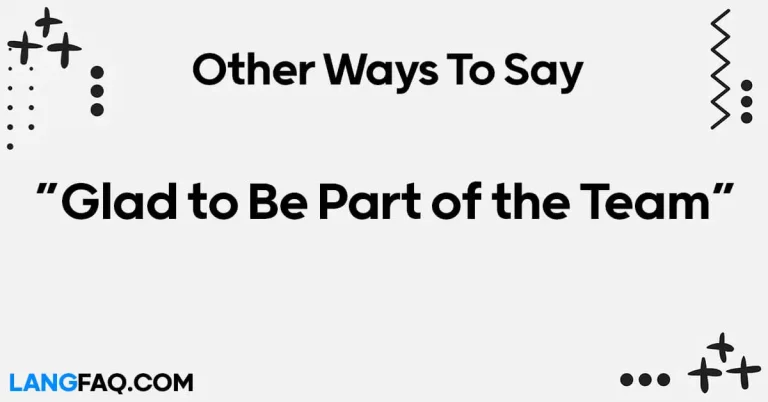In a world where effective communication is paramount, mastering the art of politeness becomes indispensable. “12 Other Ways to Say “May You Please”” is not just a phrase; it’s a gateway to refined interactions. In this guide, we’ll explore diverse expressions, delve into cultural nuances, and equip you with the tools to communicate politely in any situation.
12 Other Ways to Say “May You Please”
Here are 12 alternative ways to express “May You Please”:
- Could you kindly
- Would you be so kind as to
- Might I request
- Could you please assist with
- Would it be possible for you to
- I’d appreciate it if you could
- Could you do me a favor and
- Would you mind helping me with
- Might I trouble you to
- If it’s not too much trouble, could you
- Would you consider
- Could you spare a moment to
Here’s a table with meanings and examples for the 12 Other Ways to Say “May You Please”:
| Expression | Meaning | Example |
|---|---|---|
| Could you kindly…? | Polite request | Could you kindly send me the report by tomorrow? |
| Would you be so kind as to…? | Request with courtesy | Would you be so kind as to pass me the salt, please? |
| Might I request…? | Formal inquiry | Might I request your assistance in completing this task? |
| Could you please assist with…? | Seeking help | Could you please assist with setting up the meeting room? |
| Would it be possible for you to…? | Exploring feasibility | Would it be possible for you to attend the meeting at 3 PM? |
| I’d appreciate it if you could…? | Expressing gratitude and request | I’d appreciate it if you could review the document. |
| Could you do me a favor and…? | Requesting a favor | Could you do me a favor and pick up some groceries? |
| Would you mind helping me with…? | Seeking assistance politely | Would you mind helping me with this heavy package? |
| Might I trouble you to…? | Formal request | Might I trouble you to share your expertise on this matter? |
| If it’s not too much trouble, could you…? | Polite request | If it’s not too much trouble, could you proofread my essay? |
| Would you consider…? | Request with a suggestion | Would you consider joining our team for the project? |
| Could you spare a moment to…? | Asking for time | Could you spare a moment to discuss the upcoming event? |
In conclusion, these alternative expressions provide a versatile range of polite ways to make requests and seek assistance. Choosing the right phrase enhances communication by adding nuance and courtesy to your language, contributing to more effective and considerate interactions.
Is It Correct to Say “May You Please”?
The phrase “May you please” is grammatically correct, but its usage might sound a bit formal or old-fashioned in modern English. It is a polite way of making a request, often used when seeking permission or asking for a favor. However, in everyday conversations, people commonly use other more common and casual alternatives.
Contextual Usage:
Formal Situations:
In formal or written communication, “May you please” can be appropriate, especially when addressing someone of higher authority or in official requests. For instance:
- “May you please submit the report by Friday for our records?”
Informal Conversations:
In casual or everyday conversations, the phrase might feel a bit too formal, and alternatives like “Could you please,” or “Can you please” are often preferred. For example:
- “Could you please pass the salt?”
Politeness Considerations:
While “May you please” is grammatically correct, using “Could you please” or “Would you please” can sound more natural and polite in various contexts.
Grammar Insights:
- “May” as a Modal Verb: In this context, “may” is a modal verb used to express permission or possibility. However, its usage in this way is less common in contemporary English.
- Politeness Levels: The choice of politeness levels can vary based on the formality of the situation and the relationship between the speakers. “May you please” might be perceived as overly formal in casual settings.
- Alternatives: Consider using alternatives like “Could you please,” “Would you please,” or “Can you please” for more commonly accepted and natural-sounding requests.
Tips for Usage:
- Formality Matters: Reserve “May you please” for formal or written contexts where a higher level of formality is expected.
- Consider the Relationship: In everyday conversations, especially among friends or colleagues, opt for alternatives that strike a balance between politeness and familiarity.
- Read the Room: Gauge the formality of the situation and choose your phrasing accordingly.
Professional Mail Example With “May You Please”
Subject: Request for Document Submission
Dear [Recipient’s Name],
I trust this email finds you well. May you please submit the finalized version of the quarterly report by close of business today? Your prompt attention to this matter is greatly appreciated as we aim to meet our internal deadlines for review.
If there are any challenges or additional information needed, may you please notify me at your earliest convenience? Your cooperation in this regard is crucial to ensuring the accuracy and timeliness of our reporting.
Thank you for your continued dedication to our shared goals, and I look forward to receiving the updated document.
Best regards,
[Your Full Name] [Your Position] [Your Company] [Your Contact Information]
Could You Kindly…?
When seeking assistance or making a request in a polite and formal manner, “Could you kindly…?” is a phrase that effortlessly conveys respect. This expression is versatile, fitting seamlessly into professional or casual contexts.
Scenario:
Imagine you’re in a professional setting, working on a collaborative project with colleagues. You need someone to review a document.
Example Sentence:
“Could you kindly review the attached document and provide your feedback by the end of the day?”
Dialogue Snippet:
Colleague: Hey, I noticed you’re finalizing the report. Could you please take a look at this section?
You: Absolutely, could you kindly point out the specific part you’re concerned about?
Email Sample:
Subject: Request for Document Review
Dear [Colleague’s Name],
I hope this email finds you well. I’m currently finalizing the report for our upcoming presentation. Could you kindly review the attached document and provide your valuable feedback by the end of the day? Your insights are greatly appreciated.
Best regards, [Your Name]
Variations:
- Colleague: “Can you kindly…”
- Friend: “Mind taking a look at this?”
- Mentor: “Would you mind reviewing this document for me?”
Dictionary Insight: “Kindly” is an adverb that means in a kind or generous way. Using it in requests adds a layer of politeness to the sentence.
Tips:
- Use “Could you kindly…?” when formality and politeness are crucial.
- Reserve it for situations where you are seeking a favor or assistance.
Would You Be So Kind As To…?
In the realm of polite requests, “Would you be so kind as to…?” is a phrase that adds a touch of formality. It’s perfect for scenarios where you want to express gratitude in advance.
Scenario:
You find yourself in a formal business meeting, and you need someone to share their insights on a particular topic.
Example Sentence:
“Would you be so kind as to share your expertise on the current market trends during our next meeting?”
Dialogue Snippet:
Colleague: We’re discussing market trends in the next meeting. Do you have any insights?
You: Would you be so kind as to share your expertise on this matter?
Email Sample:
Subject: Request for Your Expertise
Dear [Colleague’s Name],
I hope this email finds you in good spirits. We’re delving into market trends in our upcoming meeting, and your expertise would be invaluable. Would you be so kind as to share your insights during the session?
Thank you in advance.
Best regards, [Your Name]
Variations:
- Friend: “Mind giving me a hand with this?”
- Mentor: “Could you lend your expertise to this matter?”
Dictionary Insight: The phrase “be so kind as to” is a polite way of asking someone to do something.
Tips:
- Use “Would you be so kind as to…?” when a high level of formality is appropriate.
- Employ it in situations where you’re requesting a favor that requires the person’s expertise.
Might I Request…?
For a formal and respectful inquiry, “Might I request…?” is a powerful phrase. It’s suitable for situations where you want to acknowledge the significance of the request.
Scenario:
You’re organizing an event, and you need a colleague to handle a crucial task.
Example Sentence:
“Might I request your assistance in coordinating the logistics for the event next week?”
Dialogue Snippet:
Colleague: We need someone to handle the logistics for the event.
You: Might I request your assistance in coordinating that aspect?
Email Sample:
Subject: Request for Assistance – Event Logistics
Dear [Colleague’s Name],
I trust this email finds you well. As we prepare for the upcoming event, might I request your valuable assistance in coordinating the logistics? Your expertise in this matter is highly appreciated.
Thank you for considering.
Best regards, [Your Name]
Variations:
- Friend: “Could you help me out with this?”
- Mentor: “I’d like to request your guidance on this matter.”
Dictionary Insight: “Request” is a noun or verb that means the act of asking for something.
Tips:
- Use “Might I request…?” in formal settings or when acknowledging the significance of the request.
- It’s effective when seeking assistance or collaboration on a task.
Could You Please Assist With…?
When a straightforward request is needed, “Could you please assist with…?” is a clear and polite way to seek help. It’s suitable for both professional and casual scenarios.
Scenario:
You’re working on a project, and you need a colleague’s expertise to complete a specific task.
Example Sentence:
“Could you please assist with finalizing the financial projections for the upcoming presentation?”
Dialogue Snippet:
Colleague: We’re wrapping up the presentation, and we need the financial projections.
You: Could you please assist with finalizing those projections?
Email Sample:
Subject: Assistance Needed – Financial Projections
Dear [Colleague’s Name],
I hope this email finds you well. As we approach the final stages of the presentation, could you please assist with finalizing the financial projections? Your expertise in this matter is crucial.
Thank you for your support.
Best regards, [Your Name]
Variations:
- Friend: “Mind giving me a hand with this task?”
- Mentor: “Could you provide guidance on completing this task?”
Dictionary Insight: “Assist” is a verb that means to help or support someone.
Tips:
- Use “Could you please assist with…?” when you need straightforward help or collaboration.
- It’s effective for both professional and casual requests.
Would It Be Possible For You To…?
When exploring the feasibility of a request, “Would it be possible for you to…?” is a diplomatic and considerate way to phrase your inquiry. It’s versatile and can be applied in various contexts.
Scenario:
You’re coordinating a team project, and you need a team member to take on an additional task.
Example Sentence:
“Would it be possible for you to handle the data analysis for this project? Your expertise in this area would be invaluable.”
Dialogue Snippet:
Team Member: We’re dividing tasks for the project. Could you handle data analysis?
You: Would it be possible for you to take on the data analysis part?
Email Sample:
Subject: Request for Your Expertise – Project Task
Dear [Team Member’s Name],
I trust you’re doing well. As we assign tasks for the upcoming project, would it be possible for you to handle the crucial data analysis aspect? Your expertise in this area would significantly contribute to our success.
Thank you for considering.
Best regards, [Your Name]
Variations:
- Friend: “Think you could manage this for me?”
- Mentor: “Would it be feasible for you to guide me through this task?”
Dictionary Insight: “Possible” is an adjective that means capable of being done.
Tips:
- Use “Would it be possible for you to…?” when exploring the feasibility of a request.
- It’s considerate and allows the person to assess their ability to fulfill the request.
I’d Appreciate It If You Could…
Expressing gratitude while making a request is seamless with the phrase “I’d appreciate it if you could…?” It combines politeness with acknowledgment, making it effective in various scenarios.
Scenario:
You’re working on a tight deadline, and you need a colleague’s input to meet the project requirements.
Example Sentence:
“I’d appreciate it if you could provide your feedback on the project draft by the end of the day. Your insights are crucial for its success.”
Dialogue Snippet:
Colleague: We’re finalizing the project draft. Can you get feedback?
You: I’d appreciate it if you could provide your insights by the end of the day.
Email Sample:
Subject: Request for Feedback – Project Draft
Dear [Colleague’s Name],
I hope this email finds you well. As we finalize the project draft, I’d appreciate it if you could provide your valuable feedback by the end of the day. Your insights are crucial for its success.
Thank you for your support.
Best regards, [Your Name]
Variations:
- Friend: “Mind giving me your thoughts on this?”
- Mentor: “I’d appreciate it if you could share your wisdom on this matter.”
Dictionary Insight: “Appreciate” is a verb that means to recognize the value or significance of something.
Tips:
- Use “I’d appreciate it if you could…?” when expressing gratitude for the assistance you’re seeking.
- It combines politeness with acknowledgment, creating a positive tone.
Could You Do Me a Favor And…?
Injecting a friendly and informal tone into your request is effortless with the phrase “Could you do me a favor and…?” It’s perfect for casual scenarios where you’re seeking assistance.
Scenario:
You’re planning a surprise birthday party for a friend, and you need someone to help with decorations.
Example Sentence:
“Hey, could you do me a favor and help set up the decorations for Sarah’s birthday party this weekend?”
Dialogue Snippet:
Friend: Sarah’s birthday is coming up. Need help with anything?
You: Absolutely, could you do me a favor and assist with setting up the decorations?
Email Sample:
Subject: A Little Favor for Sarah’s Birthday
Hey [Friend’s Name],
Hope you’re doing well! Sarah’s birthday is just around the corner, and I was wondering if you could do me a favor and help set up the decorations this weekend. Your creativity would be a fantastic addition!
Thanks a bunch!
Cheers, [Your Name]
Variations:
- Colleague: “Mind doing me a favor and proofreading this for me?”
- Mentor: “Could you do me a favor and share your insights on this matter?”
Dictionary Insight: “Favor” is a noun that means an act of kindness beyond what is due or usual.
Tips:
- Use “Could you do me a favor and…?” in casual and friendly scenarios.
- It adds a personal touch to your request, making it more approachable.
Would You Mind Helping Me With…?
For a polite and considerate approach to seeking assistance, “Would you mind helping me with…?” is a phrase that acknowledges the potential imposition of the request.
Scenario:
You’re in a busy office environment, and you need a colleague’s assistance with a task.
Example Sentence:
“Hey, would you mind helping me with the presentation slides? I’m running a bit behind schedule.”
Dialogue Snippet:
Colleague: Hey, need any help with the presentation?
You: Thanks! Would you mind helping me with the slides? I’m a bit behind.
Email Sample:
Subject: Request for Assistance – Presentation Slides
Hey [Colleague’s Name],
Hope you’re having a good day. Quick favor – would you mind helping me with the presentation slides? I’m running a bit behind schedule, and your assistance would be a lifesaver.
Thanks a ton!
Cheers, [Your Name]
Variations:
- Friend: “Mind giving me a hand with this task?”
- Mentor: “Would you mind assisting me with this matter?”
Dictionary Insight: “Mind” is a verb that means to be annoyed or bothered by something.
Tips:
- Use “Would you mind helping me with…?” when acknowledging the potential imposition of the request.
- It’s considerate and shows awareness of the other person’s time and effort.
Might I Trouble You To…?
Adding a touch of formality and respect to your request is effortless with the phrase “Might I trouble you to…?” It’s suitable for situations where you want to convey the significance of the favor.
Scenario:
You’re attending a conference, and you need a colleague to collect some materials for your presentation.
Example Sentence:
“Hey, might I trouble you to collect the conference materials for my presentation? I have a conflicting schedule.”
Dialogue Snippet:
Colleague: We need to collect materials for the conference.
You: Thanks! Might I trouble you to handle that? My schedule is a bit tight.
Email Sample:
Subject: Request for Assistance – Conference Materials
Hey [Colleague’s Name],
I trust this message finds you well. I have a conflicting schedule and won’t be able to collect the conference materials myself. Might I trouble you to handle that for me? Your assistance is greatly appreciated.
Thanks a bunch!
Best regards, [Your Name]
Variations:
- Friend: “Mind doing me a favor and picking up my coffee?”
- Mentor: “Might I trouble you to share your insights on this matter?”
Dictionary Insight: “Trouble” is a noun or verb that means difficulty or effort.
Tips:
- Use “Might I trouble you to…?” when conveying the significance of the favor.
- It’s effective in formal and professional settings where respect is key.
If It’s Not Too Much Trouble, Could You…?
Incorporating a polite and considerate tone into your request is simple with the phrase “If it’s not too much trouble, could you…?” It shows awareness of the potential inconvenience.
Scenario:
You need a friend to help you move to a new apartment, and you want to express your request with consideration.
Example Sentence:
“Hey, if it’s not too much trouble, could you help me move to the new apartment this weekend?”
Dialogue Snippet:
Friend: Moving this weekend, need any help?
You: Absolutely, if it’s not too much trouble, could you assist with the move?
Email Sample:
Subject: Moving Assistance – If It’s Not Too Much Trouble
Hey [Friend’s Name],
I hope this message finds you well. I’ll be moving to a new apartment this weekend, and if it’s not too much trouble, could you lend a hand? Your help would mean a lot to me.
Thanks a million!
Cheers, [Your Name]
Variations:
- Colleague: “If it’s not too much trouble, could you review this document for me?”
- Mentor: “If it’s not too much trouble, could you spare a moment to discuss this matter?”
Dictionary Insight: “Trouble” is a noun or verb that means difficulty or effort.
Tips:
- Use “If it’s not too much trouble, could you…?” when acknowledging the potential inconvenience of the request.
- It’s considerate and shows appreciation for the other person’s time and effort.
Would You Consider…?
When introducing a suggestion or proposal, “Would you consider…?” is a diplomatic and respectful way to phrase your request. It opens the door for discussion and collaboration.
Scenario:
You’re part of a team brainstorming session, and you want to propose a new approach to a project.
Example Sentence:
“Would you consider implementing a more streamlined approach to the project timeline? I believe it could enhance efficiency.”
Dialogue Snippet:
Team Member: We’re discussing project timelines. Any suggestions?
You: Absolutely, would you consider implementing a more streamlined approach?
Email Sample:
Subject: Proposal for Project Enhancement
Dear [Team Member’s Name],
I trust you’re doing well. As we discuss project timelines, would you consider implementing a more streamlined approach? I believe it could enhance efficiency and contribute to our success.
Looking forward to your thoughts.
Best regards, [Your Name]
Variations:
- Friend: “Would you consider trying this new restaurant for dinner?”
- Mentor: “Would you consider providing guidance on this matter?”
Dictionary Insight: “Consider” is a verb that means to think carefully about something.
Tips:
- Use “Would you consider…?” when proposing a new idea or approach.
- It’s effective in both professional and casual settings, fostering collaboration.
Could You Spare a Moment To…?
When seeking someone’s attention for a brief discussion or request, “Could you spare a moment to…?” is a polite and concise way to convey your need without imposing too much on their time.
Scenario:
You’re in a professional setting, and you need a colleague’s input on a project.
Example Sentence:
“Could you spare a moment to discuss the upcoming client presentation? Your insights would be invaluable.”
Dialogue Snippet:
Colleague: We’re preparing for the client presentation. Need any help?
You: Absolutely, could you spare a moment to discuss some key points for the presentation?
Email Sample:
Subject: Request for Brief Discussion – Client Presentation
Dear [Colleague’s Name],
I hope you’re having a productive day. Could you spare a moment to discuss some key points for the upcoming client presentation? Your insights would be invaluable.
Thanks for your time.
Best regards, [Your Name]
Variations:
- Friend: “Could you spare a moment to chat about this weekend’s plans?”
- Mentor: “Could you spare a moment to provide guidance on this matter?”
Dictionary Insight: “Spare” is a verb that means to make time or space for something.
Tips:
- Use “Could you spare a moment to…?” when seeking someone’s attention for a brief discussion.
- It’s concise and respectful of the other person’s time.
FAQs:
Q: Are these alternatives suitable for formal business emails? Absolutely, incorporating these alternatives can add a touch of professionalism to your business communications.
Q: Can children easily grasp and use these expressions? Yes, many of these alternatives are simple and adaptable, making them suitable for children.
Q: How can I infuse positivity into my language while making requests? Using words like “kindly” and “appreciate” can make your requests sound more positive and inviting.
Q: Are there cultural differences in expressing politeness? Certainly, different cultures have varied norms for politeness. It’s crucial to be mindful of these when communicating.
Q: Can non-verbal cues be as impactful as verbal expressions of politeness? Absolutely, body language and gestures play a significant role in conveying politeness and respect.
Q: How can I respond gracefully to a rejection? Express gratitude for considering the request and remain positive. A gracious response leaves a lasting impression.
Conclusion:
Mastering the various ways to say “May You Please” is more than a linguistic feat; it’s a journey towards effective and considerate communication. By integrating these alternatives into your repertoire, you not only enhance your language skills but also contribute to creating a more polite and interconnected world.

